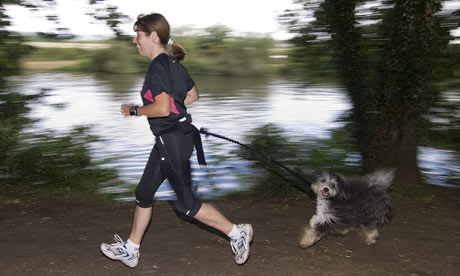
Three years ago, Didi Mann was recently retired and contemplating a life "sitting at home reading books and eating chocolate", when she read an article about Cani-X (pronounced "Cani-cross"), the sport of cross-country running while harnessed to your dog.
Despite never having participated in any sport, Mann was sufficiently intrigued to turn up at the next event, close to her West Sussex home, with her elderly border cross lakeland terrier Tess, and give it a go. She is now a British champion in the over-60s category and has become an enthusiastic member of a rapidly growing band of besotted devotees of an unlikely sport.
The British championships, established five years ago, run throughout the winter months at venues across the country, and attract up to 180 competitors for each meet. In October, the first British team competed at the European Cani-X championships in the Czech Republic; from one runner last year, the UK fielded a team of 27 competitors.
Tomorrow sees the latest event in the season, a three-mile run through Cannock Chase in Staffordshire.
Though long-established in the US and mainland Europe, Cani-X was almost unknown in this country when in 2003 Richard and Eileen Cook pinned posters on trees in the Forest of Dean asking if dog walkers were interested in getting together for a human-canine race. They now organise the national championships and last year Richard was admitted to the European federation board.
Though it is acceptable to run with your pet on a lead, serious runners invest in specialist shoulder harnesses (for their dogs) and waist belts (for themselves), attached by a bungee rope.
The etiquette is strict: no dragging of dogs, giving way to overtaking from the rear, and no shouting at dogs or members of the public. "Try to get your dog to do its business before the race," says one of the race guidelines. Runners are obliged to pick up poop, potentially losing valuable seconds.
The Cooks stumbled across Cani-X while looking for a way to train with their Siberian huskies Pasha and Alexi. They had tried the Alpine pursuit of skijoring, or skiing while pulled by dogs, but opportunities to train off-season were limited near their Cheltenham home. While looking on the internet for skijor harnesses an American correspondent mentioned an off-season activity popular there - running with dogs in harness.
For serious competitors, there is a marked potential benefit if your dog can be trained to pull. But since almost any breed of dog can outrun a human, says Eileen Cook, the type of dog is largely immaterial. "I always call it cross country running with your pet dog, because it's for every dog," she says.
"I'm sure I've seen every single breed running at our events. One woman ran with her pug."
Mann has since retired Tess and now runs with Lottie, a frisky two-year-old jack russell. She came second in her category, taking her championship tally to 57. "My grandfather used to show terriers very seriously at Crufts, though I don't know that he would have approved of his granddaughter running around with them for fun," she says. "But why not? People sort of think, 'Oh, 60s, how ghastly, what am I going to do now?' And it isn't. It's just the start of the rest of your life."
With a race season that continues until May, the Cooks are beginning to feel the strain of loading their trailer and campervan every two weeks to prune pathways and mark courses, starting, timing and commentating on races, as well as awarding the prizes.
"We would like to license the sport, so other people can run their own events." She can foresee it becoming as big as agility that is featured at 600 events a year: "That started in someone's back yard and look at it now."
Having secured an exhibition slot for the sport at Crufts last year and a repeat invitation at this year's show, her sights are now considerably higher; she is awaiting a response from the British Olympic Association to her request for an exhibition race inside the 2012 Olympic stadium.
However, the home team may have some training to do first: despite their enthusiasm, the first British assault on the European championship failed to bring home any prizes.
The sport is already more popular in the UK than the rest of Europe, Eileen thinks. Why? "Oh that's easy. We do love our dogs in this country, and we are always searching for things we can do with them."

